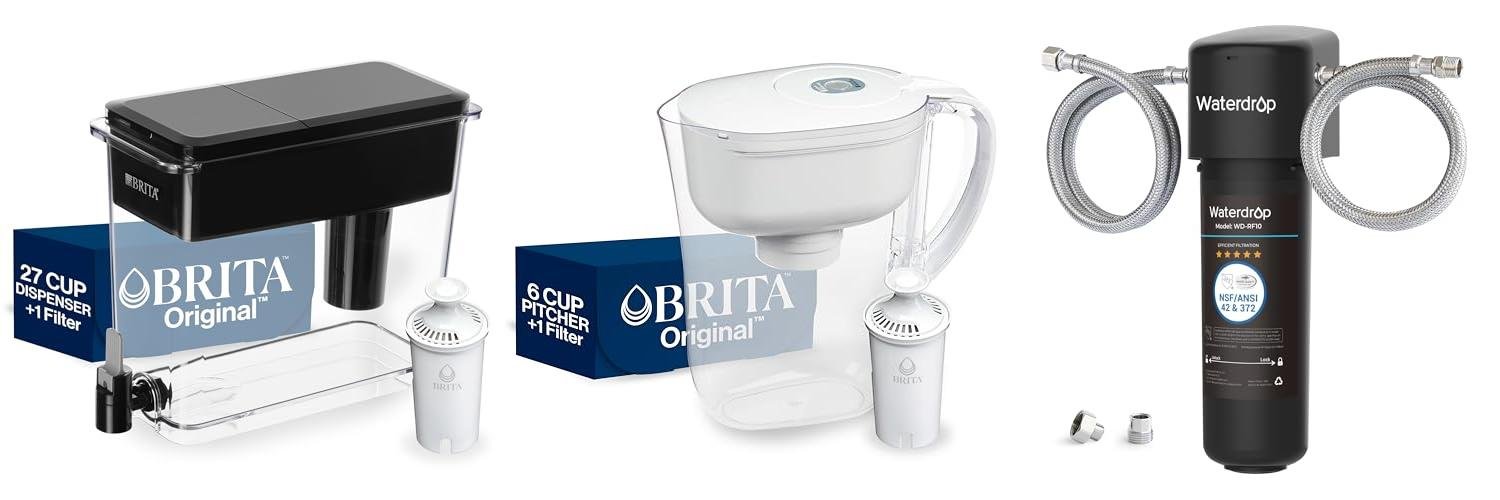Did you know that the water flowing from your tap might contain things you don’t want to drink? Tiny particles, chemicals, and even bacteria can sometimes sneak in. That thought can be a little unsettling, right?
Choosing a water filter for your home can feel like a maze. There are so many types! You have to think about what you want to remove from your water, how much you want to spend, and how easy it is to install. It’s easy to feel confused and overwhelmed. You might worry about picking the wrong filter and not getting clean, safe water.
This blog post is here to help! We’ll break down the basics of water filters. You’ll learn about the different types and what they do. We’ll also cover how to choose the best filter for your needs. Get ready to become a water filter expert! Let’s dive in and make sure your family gets the cleanest, healthiest water possible.
Our Top 5 Water Filter For Home Use Recommendations at a Glance
Top 5 Water Filter For Home Use Detailed Reviews
1. Brita UltraMax Large Water Dispenser With Standard Filter
Rating: 8.9/10
Stay refreshed with the Brita UltraMax Large Water Dispenser! This big 27-cup dispenser is BPA-free and comes with a standard filter. It helps make your tap water taste better. The Brita UltraMax removes impurities like copper, mercury, and chlorine. This dispenser is perfect for your kitchen and helps you drink healthier water every day.
What We Like:
- It removes bad tastes and odors from your water.
- You can save money by not buying bottled water.
- It is easy to fit in your fridge.
- The filter indicator tells you when to change the filter.
- It comes with one filter.
What Could Be Improved:
- You need to remember to change the filter regularly.
- It only comes with one filter at first.
Overall, the Brita UltraMax is a good way to get clean and tasty water at home. It’s easy to use and helps you make a positive change in your home.
2. Brita Water Filter Pitcher for Tap and Drinking Water with 1 Standard Filter
Rating: 9.0/10
The Brita Water Filter Pitcher is a simple way to get cleaner water. It’s a 6-cup pitcher that filters your tap water. It comes with one standard filter. The pitcher removes impurities like chlorine, copper, and mercury. It is BPA-free and white. You can save money and help the environment by using this pitcher instead of buying bottled water.
What We Like:
- It removes bad tastes and odors from tap water.
- It helps reduce harmful impurities in your water.
- The pitcher is easy to fill and pour.
- The filter indicator tells you when to change the filter.
- You can save money and use fewer plastic bottles.
What Could Be Improved:
- The filter needs to be changed every two months.
This Brita water filter pitcher is a good choice for clean drinking water. It is easy to use and helps improve the taste of your tap water.
3. Waterdrop 10UA Under Sink Water Filter System
Rating: 8.7/10
The Waterdrop 10UA Under Sink Water Filter System gives you cleaner water. It cuts down on harmful things like PFAS, lead, and chlorine. This filter connects right to your kitchen faucet. It is certified to meet safety standards. It lasts a long time and is easy to install. You can use it in your home or office.
What We Like:
- Reduces many bad things in your water, like lead and chlorine.
- Easy to install with a simple twist-and-lock design.
- Replacement filters are cheap, saving you money.
- Lasts for up to 12 months or 8,000 gallons.
- Works in many places, like kitchens and bathrooms.
- Comes with after-sales support if you need it.
- Doesn’t remove important minerals from your water.
What Could Be Improved:
- Make sure you are not allergic to coconut shells before use.
This Waterdrop filter is a great way to get better water. It is easy to use and helps you save money.
4. ZeroWater 22-Cup Ready-Read 5-Stage Water Filter Dispenser with Instant Read Out – 0 TDS for Improved Tap Water Taste – IAPMO Certified to Reduce Lead
Rating: 9.5/10
The ZeroWater 22-Cup Ready-Read 5-Stage Water Filter Dispenser is a great way to get clean water. It filters your tap water to remove bad stuff. This dispenser has a built-in meter that shows you how clean the water is. It also comes with a filter that removes many harmful things. You can enjoy better-tasting water right from your fridge.
What We Like:
- The built-in TDS meter helps you know when to change the filter.
- The 5-stage filter removes almost all total dissolved solids. This makes the water taste better.
- It is IAPMO certified. This means it removes lead, chromium, and other bad things.
- The dispenser is BPA-free.
- You can save money and help the planet by using this instead of bottled water. Each filter saves you from using up to 110 plastic bottles!
What Could Be Improved:
- Filters need to be replaced regularly.
This ZeroWater dispenser is a good choice if you want clean, great-tasting water. It’s easy to use and helps the environment.
5. iSpring WGB21B 2-Stage Whole House Water Filtration System
Rating: 8.8/10
The iSpring WGB21B is a 2-stage whole house water filtration system. It is designed to provide clean water to every faucet in your home. This filter removes dirt, rust, chlorine, and other bad stuff. It also helps your appliances last longer. The system is easy to install and change the filters.
What We Like:
- Removes sediment, chlorine, and bad tastes/odors.
- Filters can last up to a year (or 50,000 gallons) for a family of four.
- Easy to install with a pre-assembled system and included wrench.
- Keeps healthy minerals in your water.
- Comes with a money-back guarantee, warranty, and great customer service.
What Could Be Improved:
- None mentioned in the product description.
The iSpring WGB21B is a great choice for anyone wanting cleaner and better-tasting water throughout their home. It is a reliable and easy-to-use water filtration system.
The Ultimate Guide to Home Water Filters
Choosing a water filter can feel tricky. This guide helps you choose the best one for your home. We will cover key features, materials, and how to pick a good filter.
Key Features to Look For
You want a water filter that works well. Here are some key things to consider:
- Filtration Level: This is the most important.
- Sediment filters: These catch dirt, rust, and sand.
- Carbon filters: They remove chlorine, bad tastes, and odors.
- Reverse Osmosis (RO) filters: RO filters remove many contaminants. They are great for clean water but are more expensive.
- Flow Rate: How fast does the water flow? A higher flow rate is better if you want quick access to water.
- Filter Life: How long does the filter last? You should replace filters regularly. This helps keep the water clean.
- Ease of Installation: Can you set it up yourself? Some filters are easy to install. Others need a plumber.
- Size and Type: Consider where you will place the filter.
- Pitcher filters: These are small and portable.
- Faucet filters: They attach to your faucet.
- Whole-house filters: These filter all the water coming into your home.
- Under-sink filters: These are hidden under your sink.
Important Materials to Know
Water filters use different materials to clean water. Knowing these materials helps you make a smart choice:
- Activated Carbon: This is a common material. It removes chlorine and other chemicals.
- Ceramic: Ceramic filters can remove bacteria.
- Reverse Osmosis Membranes: These membranes filter out many contaminants. They make water super clean.
- Filter Housing: This is the container that holds the filter. It should be made of durable, food-grade plastic. This keeps the water clean.
Factors That Improve or Reduce Quality
Some things make a water filter better. Other things make it worse. Here’s what to watch for:
- Quality of the Filter: Look for filters certified by organizations like NSF International. These certifications mean the filter meets certain standards.
- Filter Replacement: Make sure you replace the filter regularly. This keeps the water clean. Ignoring this will make the water filter less effective.
- Water Pressure: Some filters work better with good water pressure. Check the filter’s specs.
- Ease of Use: A filter that is easy to use encourages you to use it. This is important.
- Cost: The cost of the filter and the replacement filters is important. Cheaper filters might not be as effective.
User Experience and Use Cases
Think about how you will use the water filter.
- Drinking Water: If you want clean drinking water, a pitcher or faucet filter is good. An under-sink or whole-house filter is also effective.
- Cooking: Clean water is great for cooking. Any filter type will work well for this.
- Whole-Home Use: If you want clean water for everything, a whole-house filter is the best choice.
- Travel: Pitcher filters are portable. They are great for travel.
10 Frequently Asked Questions
Here are some common questions about home water filters:
Q: How often do I need to change the filter?
A: It depends on the filter. Check the manufacturer’s instructions. Most filters need to be changed every few months.
Q: Are all water filters the same?
A: No. Water filters use different methods. They also remove different contaminants.
Q: Do I need a water filter if I have city water?
A: City water is treated, but it may still contain chlorine and other things. A filter can improve the taste and quality of your water.
Q: What is the best type of water filter?
A: The best filter depends on your needs. Consider what you want to remove from your water.
Q: How do I know if my water filter is working?
A: The water should taste and smell better. You can also test your water to see if it is cleaner.
Q: Can I use a water filter for well water?
A: Yes, but you may need a special filter for well water. This is because well water can have different contaminants.
Q: What is the difference between a carbon filter and a sediment filter?
A: A sediment filter removes dirt and rust. A carbon filter removes chemicals like chlorine.
Q: Are water filters expensive?
A: The cost varies. Some filters are cheap. Others are more expensive. Replacement filters also cost money.
Q: How do I install a water filter?
A: Some filters are easy to install. Others need a plumber. Read the instructions carefully.
Q: Where can I buy a water filter?
A: You can buy water filters online or at home improvement stores. Check reviews before you buy.
In conclusion, every product has unique features and benefits. We hope this review helps you decide if it meets your needs. An informed choice ensures the best experience.
If you have any questions or feedback, please share them in the comments. Your input helps everyone. Thank you for reading.

Hi, I’m Larry Fish, the mind behind MyGrinderGuide.com.. With a passion for all things kitchen appliances, I created this blog to share my hands-on experience and expert knowledge. Whether it’s helping you choose the right tools for your culinary adventures or offering tips to make your kitchen more efficient, I’m here to guide you. My goal is to make your time in the kitchen not only easier but also enjoyable! Welcome to my world of kitchen mastery!






